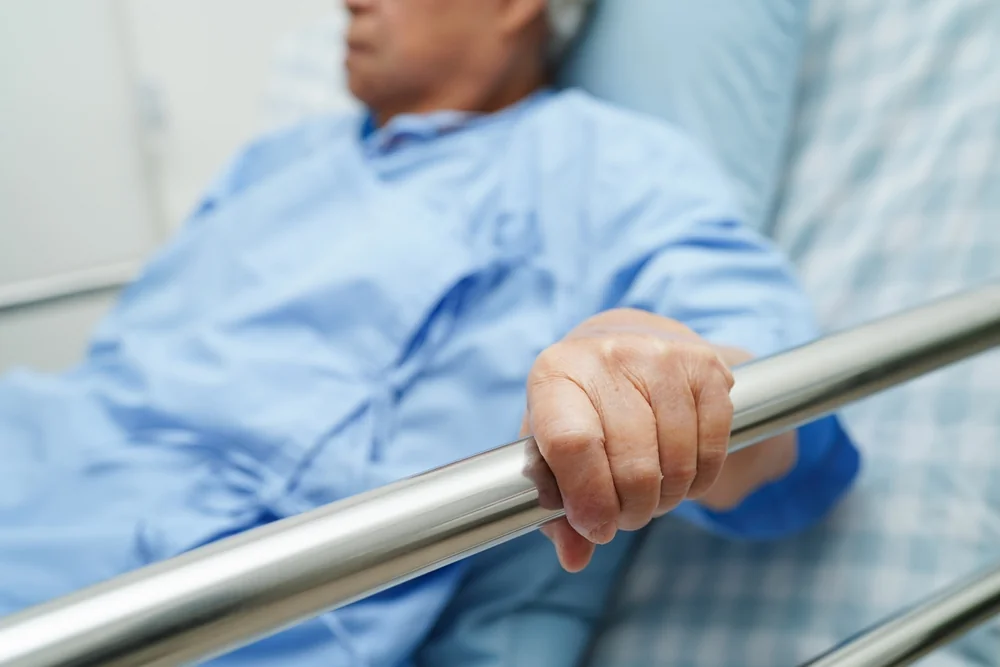Can a Family Be Held Liable for a Fall in a Nursing Home?
Nursing Home AbuseWhen a beloved family member suffers a fall in a nursing home, the first feelings are often fear and concern for their well-being. Shortly after, however, questions about how and why it happened begin to surface. In most situations, a family cannot be held legally or financially responsible for a resident’s fall. The duty to provide a safe environment and proper supervision lies with the nursing home itself.
Unfortunately, some facilities attempt to shift blame or hide evidence to avoid accountability. When this happens, working with a nursing home neglect lawyer can help you uncover the truth, protect your loved one’s rights, and pursue justice for any harm caused by negligence.
Key Takeaways about Liability for a Fall in a Nursing Home
- A nursing home has a legal “duty of care” to provide a safe environment and prevent foreseeable accidents, including falls.
- Holding a Power of Attorney or being a resident’s guardian does not automatically make a family member liable for a fall.
- Nursing homes may attempt to shift blame or use confusing language in admission agreements to create a false sense of family liability.
- In very rare instances, a family’s direct actions, such as interfering with a care plan or providing unsafe items, could be scrutinized, but primary responsibility typically remains with the facility.
- Documenting the incident and seeking legal guidance are important steps after a loved one falls in a long-term care facility.
Understanding a Nursing Home’s Fundamental Duty of Care

When you entrust a long-term care facility with the well-being of a family member, you are also entrusting them with a profound legal and ethical responsibility. This is known as the “duty of care.” In simple terms, the nursing home must act as a reasonable, prudent provider would to protect its residents from harm. This isn’t just a suggestion; it is a requirement backed by state and federal regulations.
In South Carolina, facilities are governed by regulations that set specific standards for care, staffing, and safety. A key part of this duty is fall prevention. The facility is expected to know which residents are at high risk for falls and to create and follow a specific care plan to minimize that risk.
This duty of care involves many practical responsibilities, such as:
- Conducting a thorough fall-risk assessment for each new resident and updating it regularly;
- Ensuring adequate staffing levels so that residents receive timely assistance when they need to move;
- Maintaining a safe physical environment by keeping floors dry, clearing hallways of clutter, and repairing broken equipment;
- Providing necessary mobility aids like walkers or wheelchairs and ensuring residents know how to use them safely; and
- Responding to call lights promptly so residents don’t try to get up on their own when they are unable to do so safely.
When a facility fails in any of these areas and a fall occurs, it is the facility, not the family, that has breached its duty of care.
When Do Questions About Family Responsibility Arise?
If the responsibility is so clearly on the nursing home, why would a family ever worry about being held liable? The concern often arises from the facility’s own actions after an incident. An administrator or insurance adjuster may ask pointed questions or make subtle suggestions designed to shift the focus away from the facility’s shortcomings. They might do this to protect their reputation or to try and reduce their financial liability for the resident’s injuries.
It’s important to understand the contexts in which these questions typically surface so you can be prepared and not feel intimidated.
The Role of a Power of Attorney or Guardian
Many family members hold legal authority to make decisions for their loved ones in a nursing home. This is often done through a Power of Attorney (POA) or a legal guardianship.
A Power of Attorney is a legal document where one person (the principal) gives another person (the agent) the authority to act on their behalf in certain matters, such as finances or healthcare. A guardianship is a legal relationship created by a court, where a guardian is appointed to be responsible for the personal affairs of an incapacitated person.
Holding one of these titles does not make you a 24/7 caregiver or transfer the nursing home’s safety responsibilities to you. Your role as a POA or guardian is to make decisions, not to provide the hands-on care the facility is being paid for. You cannot be held personally liable for a fall simply because you are listed as the healthcare POA. The facility retains its duty to supervise residents, manage their environment, and implement the care plan that you, as the decision-maker, may have approved.
Misinformation in Admission Agreements
Another area of confusion is the mountain of paperwork signed upon admission. These contracts can be long, complex, and filled with legal jargon. Sometimes, they include language that attempts to make a family member a financial guarantor. A “responsible party” is typically someone who agrees to use the resident’s assets to pay the bills. A “guarantor,” on the other hand, agrees to use their own personal funds if the resident cannot pay.
Federal law prohibits nursing homes from requiring a third-party guarantee of payment as a condition of admission or continued stay for residents on Medicare or Medicaid. However, facilities may still use confusing language. If a facility tries to claim you are liable for an injury because of a contract you signed, it’s crucial to have the document reviewed by an attorney. This language almost never applies to personal injury liability for a fall.
Rare Scenarios Where a Family’s Actions Could Be Scrutinized
While liability almost always rests with the nursing home, there are extremely rare situations where a family member’s direct actions could contribute to a fall. It is important to stress that these are exceptions and do not release the facility from its primary duty to supervise and protect its residents. Even if a family member makes a mistake, the nursing home staff is still expected to identify and correct potential hazards.
Here are a few hypothetical examples:
- Providing Inappropriate Items: A family brings in a beloved but rickety armchair from home for their parent’s room. The staff has previously noted that the chair is unstable and has asked the family to remove it. If the resident then falls while trying to get out of that specific chair, the facility might try to argue that the family’s actions contributed to the incident.
- Interfering with the Care Plan: A resident is on a strict care plan that requires them to use a walker and have assistance from two staff members when getting out of bed. A visiting family member, wanting to help their parent to the restroom quickly, tries to do it alone and without the walker. This could be seen as direct interference with established safety protocols.
- Withholding Critical Information: A family knows their loved one has recently started experiencing severe dizzy spells but fails to inform the nursing staff. The facility has a duty to assess residents, but if crucial, new information is intentionally withheld, it could complicate the question of foreseeability.
Even in these examples, a strong argument remains that the nursing home’s professional staff should have intervened. They are responsible for supervising residents, managing the safety of their rooms, and ensuring care plans are followed, regardless of a visitor’s actions. These situations are not about assigning blame to well-meaning families but about understanding how a facility’s defense lawyers might try to build a case.
What to Do After Your Loved One Falls in a South Carolina Nursing Home

Once your family member has received immediate medical attention and their condition is stable, your focus can shift to understanding what happened and protecting their rights. Taking a calm, organized approach can make a significant difference.
- Document Everything. Start a notebook or a digital file. Write down the names and titles of every staff member you speak with, the date and time of the conversation, and what was said. This creates a clear timeline of events.
- Take Photographs. If it is safe and appropriate to do so, take pictures of your loved one’s injuries. Also, photograph the location where the fall occurred. Look for hazards like wet floors, poor lighting, broken equipment, or clutter in the hallway.
- Request Official Records. You have the right to access your family member’s records. Formally request a copy of the official incident report related to the fall and a complete copy of their medical chart from the facility.
- Schedule a Care Plan Meeting. Ask for a formal meeting with the Director of Nursing and the facility Administrator. The purpose is to discuss how the fall happened and, more importantly, what specific steps they are putting in place to prevent it from happening again.
These steps provide you with valuable information and show the facility that you are taking the situation seriously.
Finding the Right Legal Support Near You
While you are managing the emotional and medical challenges of a loved one’s fall, the thought of legal action can feel like an added burden. However, consulting with a nursing home injury attorney can be one of the most helpful steps you take. An experienced lawyer can handle the investigation and communication with the facility and its insurance company, allowing you to focus on your family.
Many people worry about the cost of hiring a lawyer, which is why searching for an “affordable nursing home injury lawyer near me” is so common. The good news is that most personal injury attorneys work on a contingency fee basis. At Hughey Law Firm, we call this a “no win, no fee“ arrangement. It means you pay no upfront costs, and the attorney’s fee is a percentage of the financial recovery we obtain for you. If we don’t win the case, you don’t owe us a fee. This makes quality legal representation accessible and affordable for everyone, regardless of their financial situation.
An attorney can help determine if the facility was negligent and fight to hold them accountable for medical bills, pain, and suffering.
FAQs: Can a Family Be Held Liable for a Fall in a Nursing Home?
Here are answers to some common questions families have after a loved one falls in a long-term care facility.
Can the nursing home sue me for my parent’s fall?
This is extremely unlikely. For a nursing home to have a valid claim against you, they would have to prove that your specific, direct, and negligent action was the primary cause of the fall, and that their trained staff had no ability to prevent it. This is a very high bar to clear, as the facility’s duty of care is constant and comprehensive.
Does having Power of Attorney mean I’m responsible for preventing falls?
No. A Power of Attorney grants you decision-making authority, not caregiving responsibility. Your duty is to make informed decisions about your loved one’s care in consultation with medical professionals. The duty to implement safety measures and physically prevent falls remains with the nursing home staff.
What happens if my loved one fell while I was visiting them in their room?
Your presence during a fall does not automatically make you liable. The core question is whether the facility failed in its duties. For example, did they fail to provide a needed walker, leave a hazard on the floor, or ignore a call light for an unreasonable amount of time? The investigation would focus on the root cause of the fall, which is often tied to a facility’s systemic failures.
How can an attorney help prove the nursing home was at fault?
An attorney can conduct a thorough investigation that goes beyond what a family can do alone. This may include reviewing staffing records to see if the facility was understaffed, hiring medical and nursing home administration professionals to review the case, examining the facility’s history of past safety violations, and taking sworn testimony from staff members and witnesses.
Contact Hughey Law Firm Today

If your family member has suffered a serious injury from a fall in a nursing home, you deserve answers and accountability. The legal team at Hughey Law Firm has extensive experience representing residents and their families. We understand the standards of care that facilities in South Carolina must follow and are committed to holding them responsible when they fail.
If your loved one was injured in a fall in the Charleston, Mt. Pleasant, or Summerville area, contact Hughey Law Firm at (843) 881-8644 or through our online form for a free, no-obligation consultation. We work on a “no win, no fee” basis, which means our service is affordable, and you pay no attorney’s fees unless we recover money for you. Let us help you seek the justice and compensation your family deserves.
Nathan Hughey, an attorney and fourth-generation South Carolinian, founded Hughey Law Firm in 2007. Before that, he spent five years defending nursing homes and insurance companies. Leveraging his experience, he now advocates for those injured or wronged by such entities, securing over $290 million in verdicts and settlements.
